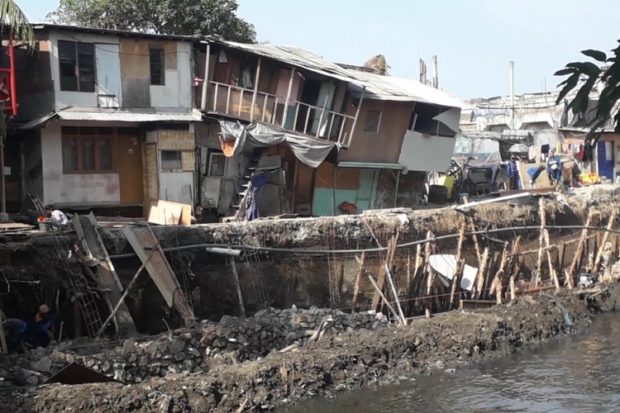Jakarta sinking fast — experts

Houses are affected by land subsidence along Ciliwung riverbank in Ancol, North Jakarta in this November 19, 2018 photo.
/Jakarta Post/Asia News Network
JAKARTA — Jakartans may see a quarter of the capital submerged with water in the next decade.
More than a quarter of Jakarta’s 661.52 square kilometers will be submerged by water in less than a decade, as the sprawling capital will continue to sink rapidly if no significant measures are taken to ensure the survival of the city, experts have warned.
Seawater could cover as much as 26.86 percent of Jakarta by 2025 and if this trend continues, 35.61 percent of the city will be completely submerged, according to a study by the geodesy research division of the Bandung Institute of Technology (ITB).
“North Jakarta alone could be 90 percent underwater by 2050,” a member of the team Heri Andreas told The Jakarta Post on Tuesday.
The city’s looming submergence, according to the study, was not primarily caused by rising sea levels but by the sinking of city itself.
ITB’s research into land subsidence from 1925 to 2015 showed that significant land subsidence began in 1975, with North Jakarta the worst affected area. Land in Marunda and Cilincing had sunk 1.5 meters by 2015. Kelapa Gading has reportedly sunk by up to 2.4 m, while the worst affected area, Pluit, has sunk up to 4 m.
Like many other global cities in the world, overuse of ground water has served as the leading cause of Jakarta’s problem.
The issue was also highlighted by a study conducted by the University of Indonesia’s (UI) math and sciences department.
UI geophysicist Syamsu Rosid said that recently published 4D microgravity research of Jakarta’s soil revealed an alarming rate of land subsidence, especially in North Jakarta. The method registers land subsidence by recording the gravitational strength of an area over the course of four years from 2014 to 2018.
“The research shows the most affected area is on Jakarta’s coast, as North Jakarta is sinking approximately 11 centimeters per year because of human activities, especially over exploitation of groundwater,” he told the Post, adding that it could affect the stability of buildings and infrastructure in addition to increasing the risk of tidal flooding as the land was now under sea level.
Jakarta’s piped-water service only covers 60 percent of the capital, according to data from Jakarta tap water company PAM Jaya. That means the remaining 40 percent of the city relies on groundwater.
Poorly enforced regulations have also led to excessive illegal groundwater use, and not only by residents. /
Disclaimer: The comments uploaded on this site do not necessarily represent or reflect the views of management and owner of Cebudailynews. We reserve the right to exclude comments that we deem to be inconsistent with our editorial standards.
